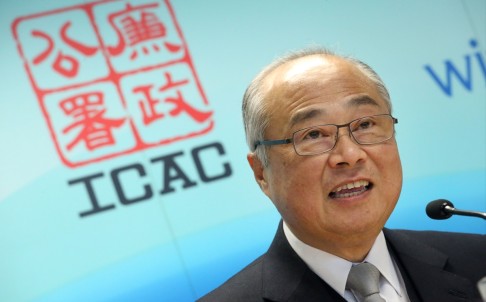ICAC restricts even small gifts in latest code of conduct for public bodies
Graft-buster suggests staff of public bodies get approval to receive gifts worth HK$500 or less
PUBLISHED : Wednesday, 24 December, 2014, 6:03am
UPDATED : Wednesday, 24 December, 2014, 6:03am
Samuel Chan [email protected]

Chow Chung-kong, chairman of the Advisory Committee on Corruption, speaks on ICAC 2014 year-ender. ICAC has tightened restrictions on employees receiving gifts. Photo: K. Y. Cheng
The graft-buster has updated its code of conduct for members of public bodies to include tighter restrictions on employees receiving even gifts worth less than HK$500 without senior approval, after the corruption-fighting agency was itself embroiled in a spending and gifts scandal.
As it introduced its updated guidelines on Thursday, the Independent Commission Against Corruption said it saw no signs of worsening corruption among the city's 113 public bodies, which include such diverse offices as the Housing Authority, Consumer Council, the Securities and Futures Commission as well as universities.
It described the update of the guidelines from its 2000 version as a precaution.
"We have noticed that the public in recent years has a higher expectation of the transparency of government departments and integrity of public office holders," said George Hui Chung-ming, principal corruption prevention officer at the ICAC.
Acknowledging there were high-profile cases or accusations of corruption concerning officials, Hui said: "But judging from the conviction records of recent corruption cases, corruption in public bodies is not serious and we see no signs" of it becoming worse.
According to ICAC figures, corruption complaints against public bodies declined to 157 cases in the months from January to November, from 257 in 2012. But the proportion of pursuable cases has also dropped from about 70 per cent in 2012 to about 50 per cent during the first 11 months this year.
The ICAC's former commissioner, Timothy Tong Hin-ming, was accused during his tenure between 2007 and 2012 of breaking rules with his lavish hospitality spending and exchange of expensive gifts with mainland officials.
The anti-graft agency's investigation into its former head is still ongoing.
While gifts worth more than HK$500 have long been prohibited or subject to approval by higher-ups, the ICAC's latest update suggests that gifts worth less than that should also be subject to tighter scrutiny.
It says board members and employees of public bodies should not accept any gifts unless written approval is given from superiors, putting the code in line with a similar guideline issued to government departments last year.
Other updates include the addition of previously convicted cases to the section on misconduct in public office, to serve as reference materials in an effort to heighten awareness, Hui said.
The update also included more detail written into sections concerning things like deferred benefit, conflicts of interest and supervisory accountability.
While no particular public bodies were singled out as facing a higher risk of corruption, Hui said, employees at organisations that had more frequent contact with the public were more likely to face confusion regarding gifts.
It is not compulsory for public bodies to adopt the graft-buster's code of conduct, but Hui said the agency would follow up with the relevant government bureaus to ensure more stringent requirements would be adopted.
He said several public bodies had already expressed interest, though he didn't name them.
